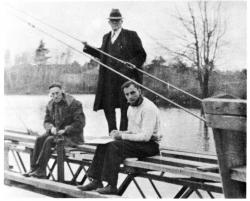
Society
Main Category
Sub Category
Era
Date Created
Location Country
us
Coordinates
42.336944, -71.834444
Address1
Alden Research Laboratory
Address2
30 Shrewsbury Street
City
Holden
State
Country
Zip
Creator
The idea of constructing a rotating boom for
hydromechanical tests at the Alden Hydraulic Laboratory
originated with Professor Charles Metcalf Allen, head of
the lab from 1896 to 1950. The original boom was designed
in 1908 by Professor Allen, assisted by two Worcester
Polytechnic Institute students.
Professor Allen needed a moving test stand for hydraulic
experiments and for rating current meters. A circular test
apparatus was chosen over a towing tank because the
former: (a) was much less expensive to construct, (b) allowed
longer test runs, and (c) enabled larger objects to be
tested without experiencing boundary effects from channel
sides.
The original boom was constructed of wood on a submerged
rock foundation located about 45 feet from shore
in a pond adjacent to the Alden Hydraulic Laboratory in
Holden, Massachusetts. This boom had a 42-foot testing
arm balanced by a 21-foot arm loaded with counterweights.
Rotational power was supplied by a 24-inch Hercules water
turbine located onshore. The power from the turbine was
transmitted to the boom through a rope and pulley drive
system, producing tip speeds of up to ten feet per second.
In 1911, the original boom was replaced by an equal-arm,
84-foot steel boom. The turbine drive system was replaced
in 1936 by an electric motor located at the center of the
boom, which increased the maximum tip speed to 20 feet
per second. The boom has been used periodically since 1936
without any major changes.
Image Credit
Courtesy ASME
Image Caption
L.J. Hooper (left), Charles M. Allen (center) and Clyde W. Hubbard (right) sit together on the rotating boom.


